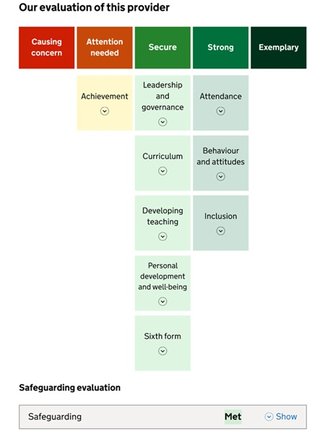Detail on the new ‘report cards’ set out today by Ofsted and the Government propose a broader range of inspection categories with a revised 5-point set of grades (‘exemplary’ to ‘causing concern’) by which schools and FE colleges will be judged. On initial reflection, the changes appear to be quite extensive, particularly for FE providers delivering multiple, different types of programmes.
Additional information: More detailed information about a school or college, with a greater number of judgments across different categories (‘evaluation areas’) and plans to add more data (e.g. comparisons to local and national averages with similar contexts), should allow parents/carers and young people to make better informed choices about providers, weighing up the information presented against their priorities. However, to get the most out of the information, it must be presented coherently and the evaluation areas (e.g. ‘curriculum’; ‘personal development and well-being') should genuinely reflect the aspects of provision that matter most to parents/carers and young people, not just Ofsted and the Government. It is noticeable that the quality of careers information, advice and guidance and pupil destinations are not explicit evaluation areas, under the plans.
Apprenticeships: Represented in up to 1/5th of the judgement grades for FE colleges and providers, apprenticeships, including achievement rates, feature strongly in the proposed report cards. Given the disappointingly low completion rates in apprenticeships (as highlighted in our Flex Without Compromise report), it is good to see Ofsted taking the matter of off-the-job learning seriously. However, caution should be taken to ensure that colleges and providers aren’t penalised for matters outside their control that contribute to apprenticeship non-completions, such as factors in apprentices’ personal life or a lack of support from the employer on the job, for example.


A new focus on wellbeing: In November, we published research looking at how staff in further education colleges experienced Ofsted inspections. 80% of respondents reported experiencing high levels of personal stress and in increase in workload before and during inspection. We welcome that leaders would have to evidence that they have prioritised staff wellbeing and workload to achieve a ‘secure’ grade in the new report card. As the consultation around these plans opens, we anticipate a return to questions around the purposes of accountability. There is a lot the Government and Ofsted can learn from the approaches taken in the other three constituent countries of the UK where our research highlights a gap between the intentions of inspectorates versus the way stakeholders interpret frameworks and experience inspections. This is a chance to reset that relationship.
We look forward to delving deeper into the plans and responding to the consultation in the coming weeks.

